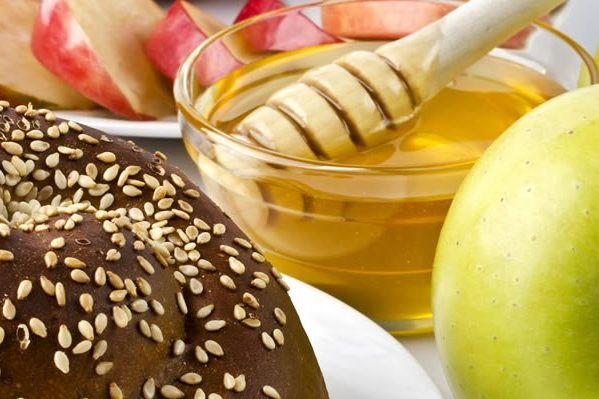Introduction
Rosh Hashana is the beginning of the Jewish calendar year (there are three other dates that begin other aspects of the Jewish year).
Rosh Hashana is observed for two days, which are considered to be one continuous day. In Temple times, a Kohen would offer a sacrifice but might not know until the following evening, after the new moon had been seen (or not), whether he had offered the Rosh Hashana offering.
Rosh Hashana focuses on the idea of God as King and of our relationship as Jews to that King.
Greetings for the New Year
For greetings for the New Year, say:
- “Ketiva V’Chatima Tova”
From: Rosh Chodesh Elul
Until: Eve of (erev) Rosh Hashana (when the holiday begins).
- “L’Shana Tova Tikateiv V’Tichateim”
From: First night of Rosh Hashana (when the holiday begins)
Until: Musaf of the first day of Rosh Hashana.
- “Gmar Chatima Tova”
From: Musaf Rosh Hashana
Until: End of Yom Kippur.
- “Gmar Tov”
From: Yom Kippur
Until: Musaf Hoshana Rabba.
Ma’ariv and Kiddush
Ma’ariv and evening kiddush for Rosh Hashana are not started until after dark.
How Many Shofar Blasts To Hear
Men are required to hear at least 60 shofar blasts on Rosh Hashana (lechatchila) in order to fulfill the commandment of hearing shofar: 30 before the musaf amida and 30 afterward. But they fulfill their requirement (b’di’avad) if they have heard at least 30 on each day of Rosh Hashana.
Women only need to hear 30 shofar blasts on each day of Rosh Hashana.
Note: Although 100 shofar blasts are blown each day of Rosh Hashana, hearing all 100 is a non-binding custom. You do not need to hear the first blasts or any other particular set, but you must hear blasts that include:
- 3 tashrat (tekiah-shevarim-teruah-tekiah) +
- 3 tashat (tekiah-shevarim-tekiah) +
- 3 tarat (tekiah-teruah-tekiah).
Interruptions after Shofar Blessing
Once the blessings have been said before (and for) blowing the shofar on Rosh HaShanah, no one in the congregation may speak or do any action (hefsek) that will interrupt the entire process of blessings and the series of blowing the shofar. Any speaking that is not related to the shofar blowing or to the prayer service is forbidden.
Woman Blowing Shofar
A woman who knows how, may blow the shofar for herself and for other women but not for men.
Reason: This is because women, who are not required by the Torah to hear shofar but who have universally accepted that custom, may not fulfill the obligation for men, who are required by the Torah to hear the shofar.
Practicing Shofar on Rosh Hashana
You may practice blowing a shofar on Rosh Hashana (unless it coincides with Shabbat).
New Fruit for SheHecheyanu on Second Night
Place a “new” fruit–over which you may say shehecheyanu–at the table for kiddush on the second night of Rosh Hashana.
Reason: So the shehecheyanu of kiddush also covers the fruit.
Note: B’di’avad, still say shehecheyanu even if you do not have a new fruit.
Symbolic Foods (Simanim):
Eating the special symbolic foods (simanim) on Rosh Hashana evening is a universally accepted custom. These may include:
- Apple Dipped in Honey
- Beets
- Black-eyed Peas
- Carrots
- Dates
- Fish Head
- Leeks
- Pomegranate
HaMotzi
On Rosh Hashana, before eating the symbolic foods (simanim):
- Make kiddush,
- Wash your hands,
- Say hamotzi, and
- Eat bread.
Then eat the symbolic foods (simanim), saying the appropriate blessings (borei pri ha’eitz, borei pri ha’adama) before eating the simanim.
God’s Name
Situation: You made up your own segulot for Rosh Hashana.
What to Do: You may say them with God’s name or without, in the yehi ratzon.
Challah Dipped in Honey
Eating challah dipped in honey on Rosh Hashana is a universal custom but is not halacha.
Tashlich
Ideally, say tashlich on the afternoon of the first day of Rosh Hashana (unless that is Shabbat, in which case say it on the second day of Rosh Hashana). You may say it until the end of the day of Hoshana Rabba.
How Much to Say
The minimum amount of the tashlich service to say is the first paragraph (mi eil kamocha).
Where to Say
Tashlich should be said near a running natural stream or a lake but not at a mikva.
Rosh Hashana: End
Saying Baruch hamavdil bein kodesh l’chol after dark at the end of Rosh Hashana (as for Jewish festivals) does not affect the additions you will then say in birkat hamazon.
Situation: You washed your hands, said hamotzi, began eating your meal on Rosh Hashana afternoon, and it is now dark.
What To Do: You may say Baruch hamavdil bein kodesh l’chol and do melacha, and then continue to eat your meal or say birkat hamazon INCLUDING ya’aleh v’yavo and harachaman hu yichadeish aleinu et ha shana hazot l’tova v’livracha.
Copyright 2015 Richard B. Aiken. Halacha L’Maaseh appears courtesy of www.practicalhalacha.com Visit their web site for more information.
This material is provided for informational purposes only – not a substitute for the consultation of a competent rabbi.

